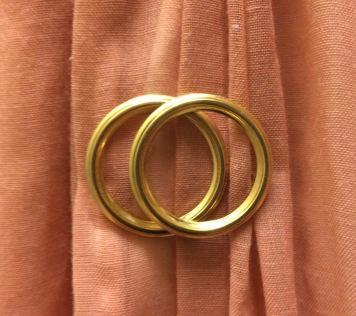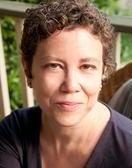
Thirty years ago, a rabbi and a minister co-officiated at my interfaith wedding. My husband and I felt strongly that both of our religions should be represented at this moment when we came together to form a family. It wasn’t easy to find a rabbi who would support us and celebrate our marriage with us in this way. Few rabbis did interfaith marriages, and even fewer would co-officiate with a minister. Many rabbis who would officiate tried to extract a promise about how the future children would be raised.
At the time, my family’s rabbi flatly refused to officiate at my marriage. My mother had to work all kinds of underground networks to find a rabbi willing to marry us. There was a risk that we would end up with a “sole officiant,” and that sole officiant would have been my husband’s beloved cousin, a minister.
I have seen progress in the Jewish communities in the intervening 30 years on many issues relating to interfaith families. Unfortunately, there is still tremendous pressure from Jewish institutions to force interfaith couples onto an “exclusively Jewish” pathway by putting conditions on the rabbi’s involvement at weddings. Ironically, some couples that want co-officiation would actually be willing to promise to give their future children an “exclusively” Jewish education and home. They simply want the Christian (or Buddhist, or Hindu) partner’s whole self to be acknowledged at the wedding, almost as a parting gift.
Recently, at the Interfaith Opportunity Summit organized by InterfaithFamily, researchers from Brandeis University presented new findings from a report entitled “Under the Chuppah: Rabbinic Officiation and Intermarriage.” Leonard Saxe and Fern Chertok write that their study provides “unequivocal” evidence that “intermarried couples whose weddings were officiated by Jewish clergy as the only officiant are more highly engaged in Jewish life than other intermarried couples.” They conclude that interfaith marriage may not be “devastating vis-a-vis the Jewish future.” But co-officiation is lumped in with Christian clergy officiation and secular officiation, with the result that the study is being interpreted as a call for rabbis to stick to sole officiation.
However, readers must resist the urge to assume that this report supports the idea that a wedding with a rabbi as a sole officiant somehow creates a more Jewish family than a wedding officiated by a rabbi and another clergy member. Beyond the greater philosophical and theological issues of what it means to be a Jewish family, or a “Jewish and” family, one must look at the context and assumptions made in producing this report.
First, as with previous reports from this group at the Cohen Center, the sample was drawn entirely from Jewish applicants to Birthright (the free trip to Israel for young people), so it excluded young people who would not or did not apply to Birthright for a wide range of political, theological, and sociological reasons. For instance, the Birthright website states that applicants must have “at least one Jewish birth parent” or have converted. A young person from the fast-growing demographic with only one Jewish grandfather, even if they identify as Jewish, is excluded. So, any result of this ongoing study cannot be said to apply to all interfaith couples, but only to interfaith couples in which the Jewish partner applied to Birthright, which is a strongly skewed subset of young Jewish people in interfaith marriages.
Second, the context here is that interfaith couples seeking officiants are often rejected by rabbis if they do not acquiesce to a list of conditions. (Less than a quarter of the interfaith couples in the Brandeis study had a sole Jewish officiant, and only 5% had co-officiants from two religions). First, many rabbis refuse to co-officiate. And even if the couple agrees to sole officiation by a rabbi, some rabbis will only perform the marriage if the couple agrees to raise future children in a “Jewish home” and withhold any interfaith education.
So those who end up with sole officiation are already a skewed sample of couples who have agreed to prioritize Judaism. It follows that of course they are going to have closer Jewish institutional ties—not because sole officiation by a rabbi magically makes them more Jewish, but because couples who want to acknowledge the Christian (or Buddhist, or Hindu, or secular humanist) partner in the wedding have been alienated. The authors write, “…it is clear that future research should explore what happens when a rabbi or cantor refuses to marry an intermarrying couple.” That is, indeed, very clear.
I asked two rabbis with extensive experience with interfaith families about how they see these officiation issues. “I have married many interfaith couples who are excited to meet with their local rabbi and join a congregation only to find out that that rabbi will only perform an interfaith wedding if the couple promises to raise exclusively Jewish children,” says Rabbi Ari Moffic of InterfaithFamily/Chicago. “Even if this couple intends to have only Judaism in the home with no religious Christianity, it is a turn-off. It is a turn-off because it seems to be based out of fear and a feeling of us-verse-them and this doesn’t feel comfortable considering that they have Christian family members who they love and who they want involved in their whole lives.”
Rabbi Moffic explains why she supports these interfaith couples. “These couples are hoping to connect with clergy who understand the beautiful messiness of modern families, and the layers and blending and dynamics that exist and how families are doing their best to pass on the traditions, customs and values that have been meaningful to them, to the next generation,” she explains. “But they are also trying to be respectful of their whole family including their partner who didn’t grow up with Judaism. They’re looking for clergy who will embrace an interfaith couple who does want Judaism in their lives and wants learning and social justice and holiday celebrations and Shabbat practices. They are looking for rabbis who also don’t cast judgment and set tests for couples to pass, which leads to ‘don’t ask don’t tell,’ and people feeling shameful about the decisions they are making. If we stop with this ‘sole Jewish officiant’ and exclusive Judaism and understand couples are doing their best and aiming for shalom bayit (peace in the home) it will feel so much more affirming and realistic.”
Rabbi Chava Bahle describes it as a privilege to co-officiate with other clergy at interfaith marriages. “My lived experience is that meeting my intercultural couples where they are–whether I am a solo or co-officiant with Christian clergy—and helping them in whatever way they engage with Judaism has been very sweet for everyone involved, even relatives who weren’t so sure. I would suggest a study in which we ask where these folk find their meaning, and how we might invite them to dialog with us. They have extremely important things to say to us, not only hear from us.”
For my husband and I, meeting with a rabbi and a minister before marriage, and having them work together with us on the wedding service, did not keep us from wanting to give our children bonds to Judaism. To the contrary, meeting a rabbi who was willing to respect my husband’s Protestant heritage and work in partnership with a minister inspired us, and inspired the family and friends who attended our backyard wedding in 1987. We appreciated the faith and confidence and bravery that rabbi displayed in agreeing to co-officiate at our wedding. And his act of supportive chutzpah played into our determination to ensure that our children celebrated Jewish holidays beyond Hanukkah, became b’nai mitzvot, and felt empowered to claim Jewish identity in the 21st century.
Susan Katz Miller is the author of Being Both: Embracing Two Religions in One Interfaith Family, from Beacon Press. She works as an interfaith families consultant, speaker, and coach. Follow her on twitter @beingboth.

